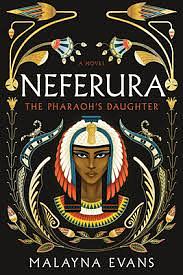Take a photo of a barcode or cover
adventurous
challenging
informative
mysterious
reflective
medium-paced
As the daughter of two pharaohs, Neferura was one of a kind. Together with her mother Hatshepsut, keeping Kemet and its people in prosperity, and preventing her half-brother Thutmose, the rightful male heir, from obtaining the throne. Fed up with his step-mother and betrayed by his sister, Thutmose launches a calculated political takedown to regain power. With the help of mysterious allies, Neferura weighs the odds of loyalty and sacrifice for the greater good.
The biggest draw for me was the feminist theme suggested in the synopsis. Breaking patriarchal norms in Ancient Egypt, the atmosphere and setting wrote itself. I appreciate the extensive research and historical accuracy from the author.
While much of Neferura’s history has been lost, this retelling was a little too on the nose. I think it would have benefited from a stronger directive or creative fantasy to make a more compelling story. The beginning was dramatic but aimless, I wanted more in terms of character development and details of Neferura’s role as the ceremonial wife. Most of the final chapter climax points happen slightly off page, Thutmose is painted as a villain but we don’t get to see that first hand, it felt disconnected.
The strongest plots, and most interesting to me, were Neferura’s friendship with Iset and the secretive network of women marked with scorpion tattoos. The themes of the book center around family, loyalty and political cunning, as well as the inequalities women have faced throughout history. Although I didn’t connect with the characters as much, I thought the book was easy to follow and the ending gratifying, skewing slightly YA but still very enjoyable.
Thank you to Sourcebooks Landmark and NetGalley for the early copy to review.
Moderate: Death, Incest
adventurous
mysterious
tense
fast-paced
Plot or Character Driven:
Character
Strong character development:
Yes
Loveable characters:
Yes
Flaws of characters a main focus:
Yes
Neferura is a historical fiction novel based upon the life of an Egyptian princess that was the daughter of two pharaohs. As her mother is co-regent over Egypt, Neferura performs the duties that would usual fall to a queen--mainly, that of God's Wife. That is until her step brother returns scheming to take back the throne in its entirety.
In a publishing era of abundant Greek and Roman mythology retellings, it was refreshing to read something of more ancient origins. Weaving historical facts with mythological legends, Malayna Evans draws us into a world of court intrigue, survival, and the strength of female friendship.
Going into the book, I was hesitant as Evans had selected a historical figure that is still a large mystery to the world. Little is known about Neferura, but it is evident that Evans dove deep into her research in order to maintain integrity of her characters and the lives they lived. The story transports the reader back to Ancient Egypt, creating vivid imagining of the temples, tombs, and palaces. Though I found Neferura frustratingly naive at the beginning of the story, watching her grow into a strong character was rewarding. At times I questioned how time was passing in the story, feeling as though more time was passing than was evident in certain characteristics, but I also didn't sit down to write out the entire timeline to confirm if it was accurate. The ending from the last chapter to the epilogue felt slightly rushed, however I am still satisfied with how neatly wrapped up things were.
Overall, Malayna Evans wrote an intriguing and engaging story. My knowledge of Egyptology and mythology is not as vast as that of my Greek, but this re-sparked my interest on the subject.
*Thank you Sourcebooks and NetGalley for an ARC in exchange for a honest review*
In a publishing era of abundant Greek and Roman mythology retellings, it was refreshing to read something of more ancient origins. Weaving historical facts with mythological legends, Malayna Evans draws us into a world of court intrigue, survival, and the strength of female friendship.
Going into the book, I was hesitant as Evans had selected a historical figure that is still a large mystery to the world. Little is known about Neferura, but it is evident that Evans dove deep into her research in order to maintain integrity of her characters and the lives they lived. The story transports the reader back to Ancient Egypt, creating vivid imagining of the temples, tombs, and palaces. Though I found Neferura frustratingly naive at the beginning of the story, watching her grow into a strong character was rewarding. At times I questioned how time was passing in the story, feeling as though more time was passing than was evident in certain characteristics, but I also didn't sit down to write out the entire timeline to confirm if it was accurate. The ending from the last chapter to the epilogue felt slightly rushed, however I am still satisfied with how neatly wrapped up things were.
Overall, Malayna Evans wrote an intriguing and engaging story. My knowledge of Egyptology and mythology is not as vast as that of my Greek, but this re-sparked my interest on the subject.
*Thank you Sourcebooks and NetGalley for an ARC in exchange for a honest review*
Moderate: Incest
my second ever NetGalley arc!
What drew me to the book was that it was a story about Egypt’s powerful priestess, Neferura. I love ancient stories & retellings of said ancient stories. However, I DNFed at 28% because the writing really did not draw me in and make me want to keep reading at all.
What I liked:
✯ Thorough historical research (Malayna Evans is an Egyptologist, after all)
✯ Little details on temple rituals sprinkled throughout
✯ Visual imagery
What I disliked:
✯ Middle-grade/YA writing even though it’s categorized as Adult
✯ One-dimensional characters
✯ Info dump via too much dialogue
Thank you to NetGalley for this ARC in exchange for an honest review.
What drew me to the book was that it was a story about Egypt’s powerful priestess, Neferura. I love ancient stories & retellings of said ancient stories. However, I DNFed at 28% because the writing really did not draw me in and make me want to keep reading at all.
What I liked:
✯ Thorough historical research (Malayna Evans is an Egyptologist, after all)
✯ Little details on temple rituals sprinkled throughout
✯ Visual imagery
What I disliked:
✯ Middle-grade/YA writing even though it’s categorized as Adult
✯ One-dimensional characters
✯ Info dump via too much dialogue
Thank you to NetGalley for this ARC in exchange for an honest review.
Being a fan of Ancient Egypt, especially New Kingdom Egypt and Hatshepsut, I was definitely excited when I saw this book was available to review on NetGalley.
Neferura follows Hatshepsut’s daughter as she navigates royal politics and escaping her dangerous fate.
Reading this, it was clearly evident that Evan did her research for this novel and wove it in with fiction. I couldn’t put this book down.
If you want to read an ancient historical fiction novel about the daughter of the first female pharaoh, this one is for you!
challenging
dark
emotional
informative
tense
slow-paced
Plot or Character Driven:
A mix
Strong character development:
No
Loveable characters:
No
Diverse cast of characters:
Yes
Flaws of characters a main focus:
No
emotional
tense
medium-paced
adventurous
challenging
emotional
medium-paced
Plot or Character Driven:
A mix
Strong character development:
Yes
Loveable characters:
Yes
Diverse cast of characters:
Complicated
Flaws of characters a main focus:
Yes
<i> "If you are to survive this, Neferura, you must learn to curate your options. Stop confusing prestige with power. Don't wait for someone else to give you permission to be potent." </i>
Thank you to Netgalley, Sourcebooks and Malayna Evans for the ARC in exchange for an honest review!
Set during the Eighteenth Dynasty in Ancient Egypt, during the reign of Pharaoh Hatshepsut, <i>Neferura</i> paints a story of political intrigue, corruption and power struggles within the royal family, with Neferura, daughter of Hatshepsut and Thutmose II, Lady of Upper and Lower Egypt, Mistress of the Lands, and God's Wife of Amun caught up between her mother's pragmatism and desire for a legacy, and her half-brother's lust to rule Egypt.
Malayna Evans breathes life into Neferura's story, previously a footnote in her mother's legacy and primarily forgotten in history. It is altogether a story of political scheming, power struggles and the pursuit of a legacy, but <i>Neferura</i>, at its heart, is a beautiful, feminist perspective on life for women in Ancient Egypt. Evans' characterisation of Neferura and Hathor highlights the different kind of power held by women in Ancient Egyptian society and the importance of female relationships. Neferura's development throughout the novel is vibrant and carefully cultivated by Evans via key events and the introduction of other strong female characters.
However, I was left a little dissatisfied with some of the pacing (Part I and some of Part II were more of an info dump and subsequently dragged on a bit), but as an ancient history nerd, I didn't mind this too much. What irked me was Hatshepsut's characterisation, which I understood was necessary from a narrative perspective, but I felt there was a missed opportunity in writing her. Especially for a novel centred around female empowerment and feminism, when there was a vibrant, exciting and intriguing story/character<i>right there</i> that was not utilised properly.
Hatshepsut went from Great Royal Wife of Thutmose II to regent for her then two-year-old half-son Thutmose III to Pharaoh in her own right. She ushered Egypt into a period of peace and economic prosperity, marked by renewed trade with western Asia, Punt and the Aegean Islands in the Mediterranean and exceptional architectural feats, namely her mortuary temple at Deir el-Bahri. Not utilising a character with such a rich history surrounding her feels like a missed opportunity.
<i>Neferura</i> by Malayna Evans is an excellent piece of historical fiction; Evans's work as a historian and her love for ancient history shines in this retelling. I've given this one 3.5 stars.
Thank you to Netgalley, Sourcebooks and Malayna Evans for the ARC in exchange for an honest review!
Set during the Eighteenth Dynasty in Ancient Egypt, during the reign of Pharaoh Hatshepsut, <i>Neferura</i> paints a story of political intrigue, corruption and power struggles within the royal family, with Neferura, daughter of Hatshepsut and Thutmose II, Lady of Upper and Lower Egypt, Mistress of the Lands, and God's Wife of Amun caught up between her mother's pragmatism and desire for a legacy, and her half-brother's lust to rule Egypt.
Malayna Evans breathes life into Neferura's story, previously a footnote in her mother's legacy and primarily forgotten in history. It is altogether a story of political scheming, power struggles and the pursuit of a legacy, but <i>Neferura</i>, at its heart, is a beautiful, feminist perspective on life for women in Ancient Egypt. Evans' characterisation of Neferura and Hathor highlights the different kind of power held by women in Ancient Egyptian society and the importance of female relationships. Neferura's development throughout the novel is vibrant and carefully cultivated by Evans via key events and the introduction of other strong female characters.
However, I was left a little dissatisfied with some of the pacing (Part I and some of Part II were more of an info dump and subsequently dragged on a bit), but as an ancient history nerd, I didn't mind this too much. What irked me was Hatshepsut's characterisation, which I understood was necessary from a narrative perspective, but I felt there was a missed opportunity in writing her. Especially for a novel centred around female empowerment and feminism, when there was a vibrant, exciting and intriguing story/character<i>right there</i> that was not utilised properly.
Hatshepsut went from Great Royal Wife of Thutmose II to regent for her then two-year-old half-son Thutmose III to Pharaoh in her own right. She ushered Egypt into a period of peace and economic prosperity, marked by renewed trade with western Asia, Punt and the Aegean Islands in the Mediterranean and exceptional architectural feats, namely her mortuary temple at Deir el-Bahri. Not utilising a character with such a rich history surrounding her feels like a missed opportunity.
<i>Neferura</i> by Malayna Evans is an excellent piece of historical fiction; Evans's work as a historian and her love for ancient history shines in this retelling. I've given this one 3.5 stars.
Graphic: Death, Domestic abuse, Pregnancy
Moderate: Animal death, Incest
Minor: Physical abuse
Overall:
This book had really solid pacing that kept me turning the page pretty quickly throughout. Last year I read "The Woman Who Would Be King" -- a non-fiction book covering Neferura's mother, Hatshepsut. So I had a pretty solid understanding of the whole "god's wife" thing and how Hatshepsut came into power, which I think helped as I read this particular book. I enjoyed the depictions of friendship, and the plot was exciting enough, but I'm not rating it higher because some of the plot points seemed out-of-place and I wasn't a super huge fan of some elements of the ending.
Characters:
Neferura was just a bit too naive/oblivious a couple of times and it felt a bit out-of-character. She has been raised at court and talks about being good with court politics, but then several times makes enormous mistakes due to her own naivety.
The friendships between her and Iset and the priestesses were lovely to see.
I felt like Thutmose came off a bit too mustache-twirly. He was just suddenly there and this sudden incredibly violent and psychotic villain.
Plot:
The ending just felt a little bit too tidy. It was nice to see a super happy ending to some degree, but I just don't believe that these particular people probably had this happy of an ending. Which I suppose is the fun of fiction at times. But this being historical fiction with a lot of elements based in reality, I guess I would have like a little bit more of a realistic ending.
This book had really solid pacing that kept me turning the page pretty quickly throughout. Last year I read "The Woman Who Would Be King" -- a non-fiction book covering Neferura's mother, Hatshepsut. So I had a pretty solid understanding of the whole "god's wife" thing and how Hatshepsut came into power, which I think helped as I read this particular book. I enjoyed the depictions of friendship, and the plot was exciting enough, but I'm not rating it higher because some of the plot points seemed out-of-place and I wasn't a super huge fan of some elements of the ending.
Characters:
Neferura was just a bit too naive/oblivious a couple of times and it felt a bit out-of-character. She has been raised at court and talks about being good with court politics, but then several times makes enormous mistakes due to her own naivety.
The friendships between her and Iset and the priestesses were lovely to see.
I felt like Thutmose came off a bit too mustache-twirly. He was just suddenly there and this sudden incredibly violent and psychotic villain.
Plot:
The ending just felt a little bit too tidy. It was nice to see a super happy ending to some degree, but I just don't believe that these particular people probably had this happy of an ending. Which I suppose is the fun of fiction at times. But this being historical fiction with a lot of elements based in reality, I guess I would have like a little bit more of a realistic ending.
Graphic: Domestic abuse
Moderate: Death, Incest, Grief, Pregnancy
Minor: Fatphobia, Infertility
Regarding the minor fatphobia: In the beginning, Neferura comments on her own body a fair amount, talking about her "gut" and how large it is. I only noticed it a handful of times, and it fizzled out at some point.
This book will be sending me into the depths of mythological and historical fiction for months to come. I was nervous at first to read this book as I was anticipating it reading similar to a dissertation or research paper- but I was so wrong. My knowledge of Ancient Egypt is minimal so I was excited to learn through this fictional story. I was immediately pulled into the relationships Neferura has with her priestesses and only wanted more as their stories developed. I have not read a story of such loyalty and friendship in a while and it was refreshing to not have the story centered around a romance. I appreciated the liberties Evans took to bring a story to us that sheds the light on Neferura. She could have picked a more well-known woman from history, but this book was exactly why I love historical fiction so much. With Evans' background in Egyptology, I am confident that this story is as accurate as it could be with what is known about Neferura. I can only hope that Evans continues to write and further to continue to write about Ancient Egypt because I will grab it every time.
Beautiful cover and interesting premise -- Neferura is the daughter of the best-known female Pharaoh, Hatshepsut. Very little is known about her life, and this book attempts to fill out her story. Discussion topics are provided for book clubs, and author q and a.
I absolutely adored the setting, historical references, and variations of female power, but would have preferred less palace intrigue and more Ancient Egypt. I geeked out more about the few pages of history provided at the end than much of the story. And I found Neferura just so naive throughout.
Thanks to NetGalley for the ARC.
I absolutely adored the setting, historical references, and variations of female power, but would have preferred less palace intrigue and more Ancient Egypt. I geeked out more about the few pages of history provided at the end than much of the story. And I found Neferura just so naive throughout.
Thanks to NetGalley for the ARC.








